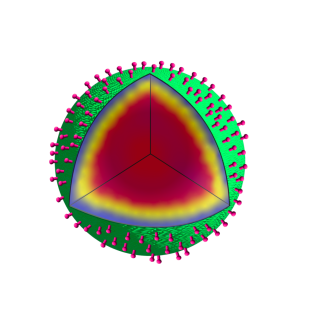News and Events
Celebrating CCR Careers: Alan Rein, Ph.D.
Alan Rein, Ph.D., is a known expert in the field of viral assembly, particularly in retroviruses like the human immunodeficiency virus (HIV). After an extensive career studying molecular mechanisms of retroviral replication and pathogenesis, he has announced his retirement.
Read MoreResearchers create a novel cancer drug delivery system inspired by bacterial spores
CCR researchers, led by Senior Investigator Kumaran S. Ramamurthi, Ph.D., have found a way to deliver drugs directly to cancerous tissue — at least in an animal model — by copying the structure of bacterial spores. Their synthetic, spore-like particles are a novel approach to avoiding the harmful systemic side effects of chemotherapy.
Read MoreIn Memoriam: Ji Ming Wang, M.D., Ph.D. (1950 – 2022)
The CCR mourns the recent passing of colleague and friend Ji Ming Wang, M.D., Ph.D., Senior Investigator and Head of the Chemoattractant Receptor and Signal Section in the Cancer Innovation Laboratory.
Read MoreNCI clinical trial leads to atezolizumab approval for advanced alveolar soft part sarcoma
NCI and CCR researchers have played an instrumental role in identifying the first treatment approved for advanced alveolar soft part sarcoma. The immunotherapy drug atezolizumab (Tecentriq) was approved by the U.S. Food and Drug Administration for the treatment of adults and children two years of age and older with alveolar soft part sarcoma that has spread to other parts of the body or cannot be removed by surgery. The CCR Pediatric Oncology Branch provided treatment and care for all trial patients under 18 years old, making this the first approval for atezolizumab in children.
Read MoreResearchers uncover stable molecular networks inside liver tumors
The ever-changing nature of tumor microenvironments makes treating cancerous tumors difficult. CCR researchers, led by Xin Wei Wang, Ph.D., Deputy Chief of the Laboratory of Human Carcinogenesis, have performed single-cell RNA sequencing analyses on samples from 44 liver cancer patients. They have uncovered stable molecular networks that cells within liver tumors use to speak with nearby immune cells, which could open a path for therapeutic exploration for liver cancer.
Read MoreDrug Combination Shows Promise for Rhabdomyosarcoma, but Can It Get to Clinical Trials?
A study led by Marielle E. Yohe, M.D., Ph.D., Lasker Clinical Research Scholar in the Laboratory of Cell and Developmental Signaling, and Javed Khan, M.D., Deputy Chief and Senior Investigator in the Genetics Branch, has identified a potential new treatment for children with rhabdomyosarcoma. The researchers are exploring options and hope to test their drug combination in human clinical trials.
Read MoreWhen chemotherapy interrupts genetic programs critical for neuronal development and activity, cells accrue DNA damage and die
To become neurons, brain cells must damage and immediately repair their own DNA. Some chemotherapies may harm neurons by interfering with this process.
Read MoreResearchers exploit novel vulnerability to deprive solid tumors of nutrients
Rapidly dividing cancer cells in solid tumors can outgrow their supply of nutrients. New research suggests that tumor support cells produce collagen-derived glutamine as a source of energy for nutrient-deprived tumors. This work reveals a novel approach for designing anti-cancer drugs that can starve solid tumors.
Read MoreRemoving risk of stomach cancer for her daughter
Stomach cancer remains deadly in the United States despite its rarity. After discovering she was at high risk for the disease, Estefania E. Marchan decided to undergo a total gastrectomy. For a subsequent pregnancy, she ensured her daughter would never face the same risks.
Read MoreClinical trial researching combination drug therapy for multiple myeloma
A clinical trial led by Elizabeth M. Hill, M.D., Assistant Research Physician in the Lymphoid Malignancies Branch, is researching hematopoietic stem cell transplants and therapy for acute myeloid leukemia.
Read MoreNew insights into why smoking causes fatty liver disease
A new study using nicotine-metabolizing bacteria sheds light on the cellular processes triggered by tobacco use and helps explain why smoking can lead to non-alcoholic fatty liver disease. Tobacco cessation is the best way to reduce the harmful effects of smoking. These findings could help researchers develop additional approaches to address smoking-related liver damage.
Read More








